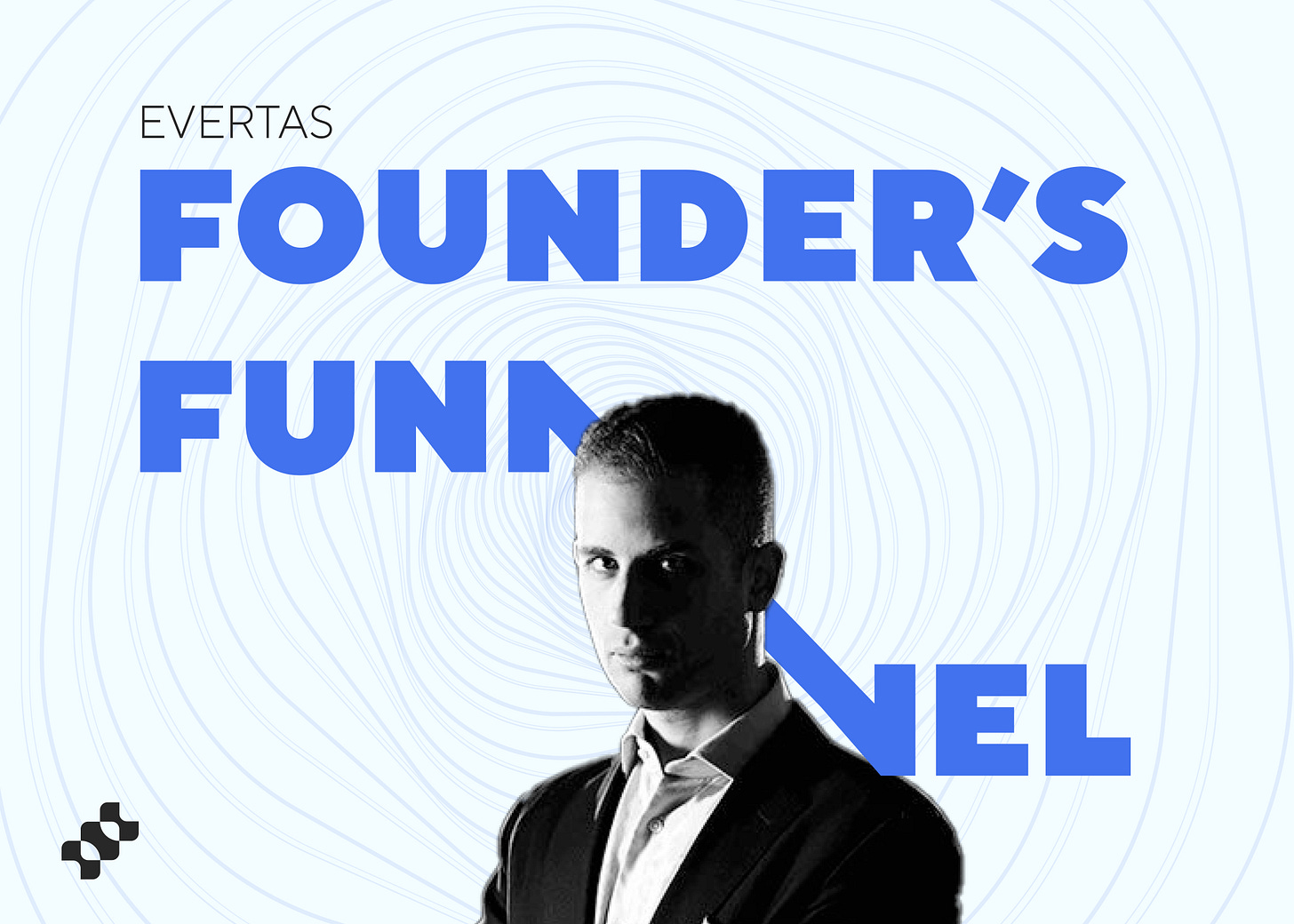While crypto markets are well on their way to becoming an established piece of the financial system, recent events have underscored the role insurance could play as a core component of market maturation through risk mitigation. Evertas Inc. (Evertas) – a Chicago-based crypto asset insurance company and Lloyd’s of London coverholder– addresses the biggest pain points in this space by covering a full spectrum of crypto risks for institutional holders of certain digital assets.
Evertas has created the only full lifecycle insurance available to date; and boasts a best-in-class underwriting framework as well as a bespoke crypto policy form and claims handling.
As a leader in early blockchain startups, and with his tenure as the first full-time blockchain hire at the world’s largest custodian bank, CEO and founder of Evertas, J. Gdanski understood the technology and the institutional environment like few others.
We caught up with Gdanski to discuss the highly specialized nature of underwriting the risk associated with crypto assets, Evertas’ rapid expansion and the types of security standards that the insurer is developing for the crypto industry– here’s what he had to say:
You can also watch it on YouTube:
What do you envision the hallmarks of a successful insurance company look like?
A successful insurance company knows first how to assess risk, second, how to set premiums accordingly and third, how to handle claims and adjust if necessary. You accomplish the first either with lots of data or lots of knowledge. Unfortunately, the crypto industry does not have much data to lean on, so we need to make up for it with deep technical knowledge, which we have. We also have a thorough and highly crypto-adapted policy application form.
A successful crypto insurance company must also be highly agile and able to scale. The speed of business in this space is measured in days or weeks, not months or years. Our agility is an important advantage. With the help of Sino Global Capital, we have the ability to scale to better meet the market’s needs.
What are the types of security standards that you aim to develop for the crypto industry?
Evertas is comprised of crypto people who happen to be working in insurance. By contrast, the others dabbling in this space are insurance people who happen to be working crypto-adjacent. One of the benefits of a strong insurance presence in an industry is the risk minimizing influence. We’re motivated not only by risk reduction as good business, but because we care deeply about the health of the space and broad-based participation in it. So, we do have several standards we’re in the process of developing and expect these user protections will increase the perceived legitimacy of the industry and expect this will in turn increase the comfort level of regulators and lawmakers around the world. We’ll be announcing some of these in the near future.
How did you define a policy framework for the risks related to typical classifications such as “hot,” “warm” and “cold storage” of digital assets?
Imagine our surprise when we dug in and realized there was no standard for defining hot versus warm storage. So, instead of waiting around for someone to come up with these taxonomies, we worked it out ourselves. You can see the result here.
This is a prime example of how industries benefit from the existence of a robust insurance market: standards get developed that get everybody speaking the same language and agreeing to compare apples to apples. That’s been missing in crypto and we’re happy to have contributed meaningfully in this area.
What do you make of the lack of global capacity to cover the digital asset market? How might this be fixed in the future?
Carriers and brokers like to talk about insuring crypto, but at the end of the day, it’s mostly just talk and the insurance capacity isn’t there. And the idea that the traditional insurance market will solve this serious problem confronting the crypto industry is incredibly naïve. This is a highly specialized field requiring deep technical know-how and agility to meet the market’s quickly-evolving needs and the incumbent carriers have neither the know-how nor the agility. Evertas has both, and we’ve built comprehensive risk transfer solutions to all problems.
Tell us about your journey getting the Lloyd’s of London approval and your collaboration with Arch.
The process takes a full year under normal circumstances, but being a new risk class and the first cryptoasset insurer to apply for coverholder status, they were very thorough and it ended up being a two-year process. Three different groups were involved, in addition to Evertas: the broker, the sponsoring syndicate, and then Lloyd’s itself. They’re trying to answer the question: can Evertas represent Lloyd’s responsibly and successfully? We’ve been told no other coverholder applicant – and there are over 4,000 coverholders – has received the level of scrutiny Evertas did. As you can imagine, being a Lloyd’s coverholder is a status we are very proud of.
Did you face any obstacles in getting the Lloyds of London coverholder? What were they?
The primary obstacles were cultural. The Lloyd’s marketplace is simultaneously extremely innovative and conservative. There were some senior executives who only knew of crypto as a tool for engaging in illicit activity. Some said, “we don’t support that.” It took some educating to help them see that this is first and foremost a transformative financial technology. We also needed to help the underwriters and risk people at various Lloyd’s syndicates understand how necessary what we do is not just for crypto, but for the insurance industry. Fortunately, we’re fluent speakers of both crypto and insurance speak, so we managed to bridge that gap. And the education continues. Now we’re focusing on educating the rest of the insurance industry, especially brokers.
What regulatory hurdles have you or do you envision coming across?
The first step was getting full regulatory approval, which we have. Being a Lloyd’s of London coverholder is greatly beneficial in this area as it allows us to work with rated, licensed and admitted paper most anywhere in the world. This is one key Evertas differentiator, since there’s a fair amount of unlicensed and unrated paper being sold out in the market. Which brings me to a significant regulatory hurdle we do deal with: the requirement that insurers work through brokers, as opposed to the insurance purchaser directly. Educating the broker community is and will continue to be a major priority for us.
A related regulatory issue that affects us indirectly is seen when entities are regulatorily required to get insurance and yet find they can’t, due to the huge capacity gap Evertas is working to fill.
We take regulatory compliance very seriously and even as we venture into an uncertain and shifting space, we’ve always stuck to the well-trod paths that keep us in strict compliance. That’s what our customers and investors deserve and we count that approach among our competitive advantages.
How would you explain what you do to my grandma?
Evertas provides insurance to companies that owners of cryptocurrencies entrust with their assets. Those firms are very attractive targets for hackers. Evertas makes sure that if they are hacked and the assets stolen, the owners are protected.
How did you know that this was a great idea to pursue?
I was working at the largest custodian bank and was looking at crypto custody, dealing with our risk people, and I realized there were three things that were needed: a way of custodying it, which existed; legal and regulatory clarity, which was emerging then and is better now; insurance, and no one was really solving this problem. It was a painfully obvious problem, and what I saw and still see is the glaring need for an insurance solution.
What are some misconceptions about the space you can clear up?
That insurance doesn’t matter. The reality is that any industry without a robust insurance market will be hampered in its efforts to grow and mature. The lack of crypto insurance [and] capacity problem will not solve itself. In fact, this problem requires a very specific kind of people, meaning cryptonatives, to step up and solve this problem off-chain. DeFi isn’t the answer, since it can’t be regulated. Evertas is helping to solve this problem. There aren’t full-time crypto insurance solutions outside of Evertas. In fact, Evertas is the only true, dedicated crypto insurance firm in the world.
What does Sino Global Capital represent to you? How has SGC helped your journey?
For entrepreneurs, interacting with VCs has the reputation of being somewhat painful. However, every interaction I had with Sino Global Capital was enjoyable and ran long. SGC is deeply invested in the success of web3 – the whole ecosystem, not just their portfolio companies. This really matters. They see blockchain technology as a means to achieve positive societal transformation. They are true partners and Evertas is better off for having connected with them and because we’re better off, the crypto space is, in turn, better off.
What plans do you have for Evertas expansion? How can Sino help you get there?
As Evertas is the first and only dedicated crypto asset and blockchain infrastructure insurance company, we are focused on solving all the risk mitigation needs of the industry. That will happen in many ways and we’re seeing a lot of progress with traditional regulated and licensed insurance. We’re expanding the breadth and depth of our offerings and adding new product types. We’ll shortly introduce crypto-denominated policies, where premiums and claims can be paid in cryptocurrency.
Sino Global Capital is a very rigorous investor with a broad network. We view SGC as a true partner bringing strategic thinking and advice that has been invaluable and will continue to be.
What advice do you have for new entrepreneurs entering this space?
I think there are three reasons to launch a startup. One: to burnish your resume. If that’s your motivation, I say don’t do it. Two: to buy a lottery ticket and potentially become very rich. If that’s your motivation, I say don’t do it. Three: to scratch an itch to create something meaningful, so profound, you cannot imagine living your life without doing it. If that’s your motivation, I say do it.







